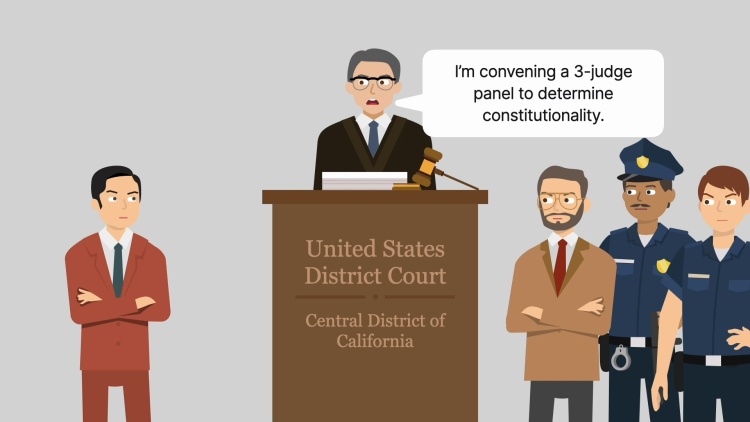Hicks v. Miranda
United States Supreme Court
422 U.S. 332 (1975)
- Written by Robert Schefter, JD
Facts
On November 23 and 24, 1973, police seized four copies of the film Deep Throat from the Pussycat Theatre in Orange County, California, where the movies had been shown. On November 26, the Orange County district attorney filed eight misdemeanor criminal charges against two employees of the movie theater for their roles in showing the film. On the same day, the Superior Court of Orange County issued a rule to show cause on the theater owners (plaintiffs) why Deep Throat should not be declared obscene under California’s obscenity statute. The theater owners objected to the jurisdiction of the court and refused to participate. After a hearing and a viewing of the film, the state court declared the film obscene and ordered all copies that were at the theater seized. The theater owners did not appeal, but instead, on November 29, they filed suit in federal district court against the district attorney and assistant district attorney of Orange County and four police officers of Buena Park. The suit alleged that the obscenity statute was unconstitutional, sought an injunction against enforcement of the statute, and asked for return of the films. On January 8, 1974, the district judge convened a three-judge panel to determine the constitutionality of the statute. Service of the federal complaint was completed on January 14, 1974, and the next day, the district attorney amended the pending criminal complaint by naming the theater owners as additional defendants and adding four conspiracy counts. On June 4, 1974, the three-judge panel issued a judgment declaring the California obscenity statute unconstitutional and ordering return of all copies of the film. The United States Supreme Court granted certiorari.
Rule of Law
Issue
Holding and Reasoning (White, J.)
Concurrence (Burger, J.)
Dissent (Stewart, J.)
What to do next…
Here's why 904,000 law students have relied on our case briefs:
- Written by law professors and practitioners, not other law students. 47,100 briefs, keyed to 995 casebooks. Top-notch customer support.
- The right amount of information, includes the facts, issues, rule of law, holding and reasoning, and any concurrences and dissents.
- Access in your classes, works on your mobile and tablet. Massive library of related video lessons and high quality multiple-choice questions.
- Easy to use, uniform format for every case brief. Written in plain English, not in legalese. Our briefs summarize and simplify; they don’t just repeat the court’s language.





